Destroyer 113 - The Empire Dreams
VIP免费
2024-12-11
1
0
392.76KB
123 页
5.9玖币
侵权投诉
Destroyer 113: The Empire Dreams
By Warren Murphy and Richard Sapir
PROLOGUE
He watched the old men climb the bitterly cold, windswept beaches, proudly reliving memories of their hazy youth.
And he remembered.
He watched tired soldiers, teary-eyed and long-retired, grow maudlin and weepy in the midst of row-upon-row of whitewashed
crosses and fluttering flags.
And his resentment spread.
He watched presidents and prime ministers-too young or cowardly to have participated in those dark events themselves-laud the
sacrifices of those who had fallen in the conflict, old now by many decades. And he seethed.
He watched hours upon hours of documentaries and news reports retelling the horrors of a struggle that could not possibly be
understood by an outsider. And the hatred grew....
Chapter 1
He had decided long before that he preferred being feared to being liked. It was his experience that people who were liked were not
respected. He wanted respect. And fear-when used judiciously-always, always bred respect.
Not that fear did Nils Schatz much good these days.
He was retired. Not by any choice of his own. It had been a forced retirement.
Those who had inflicted this malady of inactivity on him weren't fearful of him. The young ones were like that these days. They
knew his past, yet they didn't care. And of all the young ones, Kluge was the worst.
Adolf Kluge was the current head of IV, and it was Kluge whom Nils Schatz was meeting with this morning. Regrettably he
couldn't hope to inspire fear in the IV director. But Schatz did hope that the young man would listen to reason.
The air of the village was cold in his throat as he made his way down the tidy cobbled streets. The gleaming bronze tip of his
walking stick clicked a relentless, impatient staccato on the perfectly shaped gray stones.
He passed between narrow passageways designed only for single-lane traffic. Most people either walked or used bicycles to get
around the village.
As he strolled along, several people on bikes passed by in either direction. The older ones facing him nodded politely as they
slipped by. The impertinent young ones didn't even pay any attention to him. Coming from the other direction, those his age
hunkered down over their handlebars and kept their backs to him.
The older ones understood who and what Nils Schatz had been. They still feared him.
But it was no longer enough.
Schatz quickened his pace. His meeting with Kluge was at eight o'clock. He checked his watch. He would be ten minutes early.
The whitewashed buildings smelled of freshly baked bread. They were lined up in perfect cookie-cutter formation along the narrow
lane. There were no front yards. The stoops opened out directly onto the street.
Schatz could see dumpy elderly housewives moving just inside the immaculate windows that looked out to the lane.
The whole village was supposed to remind everyone in it of a picture-perfect Bavarian town. From the gaily painted shutters and
window boxes to the neatly tiled roofs. The spotless streets and orderly shops were meant to give the impression that a chunk of
Europe had been transplanted somehow to the mountains of Argentina.
But that was not the case.
What the IV village represented was an admission of failure. Those who lived there had been forced to flee the land of their birth
and were now deluding themselves into thinking that they had brought some of that land with them.
The sorry fact was, this was not home. And for Nils Schatz, it hadn't been home for more than thirty years.
His breath made fragile puffs of mist in the crisp mountain air. Each puff brought him closer to his last. Soon, there would be no
more. It was as if his life were mocking him-floating out before him in this land of his exile.
The last of the neat little houses broke away into a wide-open field. The cobbled path led into a much older stone road.
A vast shadow cast the ancient roadway in shades of washed-out gray. Through rheumy eyes Schatz followed the shadow to its
origin.
Up ahead loomed Estemago de Diablo, the "Belly of the Devil." That was what the locals called it. It was an ancient fortress of
mysterious origin. Some thought it was Aztec, while others argued that it was Mayan. No one knew for certain who had built the
huge stone edifice.
The palace, the ancient roads and the terraced fields in the surrounding terrain were all that remained of an empire that had peaked
and died more than one thousand years before.
The irony that the IV village had sprung up in what was essentially the ruins of a dead thousand-year empire was not lost on
anyone there. For Nils Schatz, it was a lack of respect for the old ways that had brought them here at all.
The huge stone structure squatted on a separate mountain peak from the rest of the village. Schatz crossed the perfectly preserved
rock bridge that spanned the chasm between the peaks.
He did not reflect on the remarkable engineering accomplishment the bridge represented. It was just something for him to tap his
highly polished cane impatiently upon as he crossed into the bowels of the massive fortress.
There were four guards within the gigantic old archway. All were blond haired and blue eyed with muscular physiques. They also
were each indistinguishable from one another. They stared, mute, at Schatz as he passed.
The guards were not simply being polite. The men were incapable of speech. They had been genetically engineered by the late Nazi
scientist, Dr. Erich von Breslau. Some DNA glitch had robbed them of the ability to speak. In an earlier time, they would have
been rightly executed as imperfect. In IV they were kept as soldiers.
So unlike the old days, Schatz thought, not with sadness but with bitterness.
His face creased in severe lines, he found his way down the vaulted stone corridor to the office of Adolf Kluge.
KLUGE READ THE PROPOSAL without a hint of expression.
He scanned each line with patient eyes, occasionally wetting his lower lip with the tip of his tongue. It was a habit he had
developed years before in school. He didn't even realize he was doing it.
When he was finished, he tapped the sheaf of papers into a tidy bunch. He set them neatly aside. "Interesting," the head of IV
mused, looking up. Nils Schatz sat in a too comfortable chair on the other side of Adolf Kluge's desk. He had waited impatiently
for half an hour as Kluge carefully read the proposal-a proposal he should have read weeks before.
"How soon can we begin?" Schatz pressed.
Kluge raised an eyebrow. "This isn't the regular way we do things around here, Nils," he said. "There are committees that sort
through this kind of thing." He indicated the stack of papers with a wave of his hand.
"Committees," Schatz spit angrily. "Everything in this infernal village is governed by committees. No one wants to do anything
anymore. We just fill out forms and pass them up to others, who throw them away. We must start this, Adolf. Soon." His eyes
were fearsome with just a hint of desperation. His balled fist shook with pent-up rage.
Kluge sighed. He drummed his fingers delicately on his desktop as he looked over at the picture that hung from the mahogany-
paneled wall of his large office. The eyes of Adolf Hitler-Kluge's namesake-glared arrogantly from beneath a sheet of gleaming
glass.
"How old are you, Nils?" Kluge asked gently.
Schatz stiffened. "I fail to see the relevance of that question."
"I think it may be relevant, my old friend."
"I am not old," Schatz insisted, seething. He stopped short of saying that neither was he Kluge's friend.
Kluge nodded thoughtfully. "I suppose it may be a matter of perspective. You appear to be in very good physical condition."
"I exercise daily."
"Nonetheless," Kluge pressed, "you must notice that there aren't many like you left. You are one of the few people left in the
village from the old school."
"Again, I fail to see the relevance."
The leader of IV smiled wanly. "This proposal of yours is from another era," Kluge said, pressing his palm to the stack of papers.
"IV simply does not have the physical resources it once had to mount a campaign this ... ambitious. Perhaps your efforts would be
better spent here at the village. I understand you have a garden."
"Do not dare patronize me, Kluge," Schatz growled. "I am not some mental defective."
In days gone by, his tone would have sent men scurrying like frightened mice-desperate to apologize. Not anymore. Adolf Kluge
merely looked at Schatz with the patience the young reserved for old men with foolish dreams of glory.
"I am not patronizing you, Herr Schatz," Kluge replied slowly. "I am merely telling you the financial realities of IV's current
situation. You know of the events surrounding the failure of Platt-Deutsche?"
"I know that the company failed. While you were in charge here," Schatz added icily.
Kluge almost laughed at him at that point. Almost laughed! The impertinent toad had the nerve to snicker. Nils Schatz resisted the
urge to leap across the desk and throttle the much younger man. "Yes, I was the one who left Lothar Holz in charge during the
company's brush with the men from Sinanju. Had I known the threat they posed, I would have taken different measures. Or
instructed Holz to back away. Slowly."
"Instead you pressed ahead. Holz died along with Dr. von Breslau. And the company failed as a result of the lawsuits generated by
the computer-to-brain uplink system they had developed. All of this could have been construed by some to stem from a lack of
leadership here at IV."
"You made that clear at the time."
"With me, there are no secrets," he said. This time it was Schatz who resisted the urge to smile. "That may be true," Kluge said,
"but as a result of that misadventure, IV lost a very lucrative company. We still have other assets, obviously, but in the current
market we need to take a step back and recognize our long-term fiduciary responsibilities. Take you, for instance. There are not
many left of your generation, but there are many more only a decade or two younger than you. I need to think of their future well-
being. It is not as if they can go out and find work elsewhere. IV is responsible for their retirement expenses. You need to
understand, Nils, that these are not the old days."
Schatz's eyes were hooded. When he spoke, the words were lifeless.
"You are more concerned with walkers and bedpans than you are with fulfilling the mission of this village?" he asked flatly.
"I am sorry, Nils, but I see our mission from an entirely different perspective. If I am able to care for these people in their infirmity,
then I see that as a fulfillment of our original charter. Of course, there are other concerns. But the events at PlattDeutsche America
are only a few months old. I will address the interests of our founders as soon as IV is financially able."
That was it. The meeting was over.
Schatz stood. When he spoke, his tone was ice. Every word dripped menace.
"You may remove me from the rolls of those for whom you feel responsible to care."
His eyes chips of flinty rage, he wheeled around, heading for the door. He collected his metal-tipped walking stick from its resting
spot against the heavy wooden frame.
"Nils, be reasonable," Kluge begged patiently. He stood, as well. "You must see this from my perspective. Your goals are too
high. This plan of yours would never have worked."
It was too much to bear. Schatz spun back around, eyes mad. He aimed the blunt end of his cane at Kluge.
"Silence! You shame me! You shame him!" He stabbed his cane wildly toward the portrait on the wall. "You shame the people
who built this haven! You are a disgrace, Adolf Kluge. To everything the movement represents. A disgrace and a coward."
The cane quivered in the air. It was not merely for effect. For a moment Kluge actually thought the old man might attack him.
Whatever thought Schatz might have had, passed quickly. The cane snapped down to the floor with an authoritative crack.
Spinning on his heel, Nils Schatz marched from the room, slamming the huge oaken door behind him. As the noise rumbled off
through the old fortress, Kluge could hear the old man's cane tap-tap-tapping along the echoey stone floors of the cavernous
corridor.
The sound died in the distance.
Alone in his office, Kluge sat back down, frowning deeply.
He drew the stack of papers detailing Schatz's proposal across his desk.
The words on the cover sheet were in German. Kluge was surprised at the difficult time he had reading his native tongue these
days. Most of the business he conducted for the village was in English. He read the words again. Carefully.
"Der Geist der stets verneint. " "The spirit that never dies." Kluge smiled wanly.
"My poor old Nils," he mused. "Pity you don't realize your day died more than half a century ago." Gathering up the sheets of
paper, Adolf Kluge dropped them in the trash barrel next to his tidy desk.
Chapter 2
His name was Remo and he liked nuns.
It was a drastic change from the earliest opinion he could remember having. There was a time in his youth when he had hated nuns.
More often than not, he had feared them.
But that was a long time ago. Back when Remo Williams was a ward at Saint Theresa's Orphanage in Newark, New Jersey, the
nuns told him when to go to bed, when to get up, when to go to school and, most important of all, when to go to church. Hate
and fear went hand-in-hand during those years.
Now, on this cool summer night, as he walked the darkened streets of Nashua, New Hampshire, Remo was surprised at how
completely his attitude had changed. The respect he felt for the women who had raised him was not grudging but absolute. But
even though Remo's opinion of these "brides of Christ" had evolved over the years, he knew with sickening certainty that there
were some who did not share his enlightened attitude. He was after one in particular.
Curved street lamps gathered swarms of flitting flies and moths around their dull amber glow. What little weak light that managed
to carry down to the sidewalk on which he strolled illuminated the funereal lines that traced Remo's cruel features. He was deep in
thought.
Remo was a man of indeterminate age. Most who saw him placed him somewhere in his thirties. His short hair and deepset eyes
were as dark as the night through which he passed like a vengeful shadow. His T-shirt and chinos were black.
Remo was here this night because of a simple news report. One like so many others that had interrupted regular television programs
of late.
Back in the days after Saint Theresa's, when Remo had been a beat patrolman living in a dingy Newark walk-up, such break-ins by
news anchors were rare. They heralded only the most dire tidings. Back then, when Walter Cronkite appeared, Mr. and Mrs.
America sat up and took notice.
Over the years, as the uncommon of America's subculture slowly and insidiously became the norm, the anxiety traditionally
brought on by a special news bulletin gradually washed away. Now, an entire generation was desensitized to the violence that
spilled regularly from their TVs like coins from a one-arm bandit. When the anchorman appeared these days, America now hoped
he wouldn't be on too long into "Friends" just before they hurried out to the fridge for a snack.
But this night, Remo had been paying attention. And when the blow-dried anchor spoke of what had happened across the border
from where he lived in Massachusetts, something in his frigid soul cracked like ice settling on a pond.
The sound of sirens that had filled these same streets on television had echoed to silence up the Merrimack Valley by the time
Remo had arrived in Nashua. He left his car on a residential side street in the south end of town.
Like metal to a magnet, Remo was drawn to the buzz of activity in the center of town.
He found the vans first. Call letters and painted logos identified them as members of the Boston media. Satellite dishes atop their
roofs pointed south as the men and women farther ahead reported the gruesome details of the day's events back to their home
stations.
The gaggle of reporters squeezed in around a small building that seemed out of place for such attention. The Nashua police station.
To Remo, the press there represented an intrusion on the simpler world he had known as a child.
"...was once a small town has grown into the era of urban violence," a reporter with a serious voice was announcing into a
mushroom-shaped microphone as Remo slipped past.
"...are telling me they can't remember the last time such a violent act was committed in Nashua, Peter," another was saying.
"Good eeee-vening!" screeched a third. "I'd like to give a big hello out there for all the kids in Sister Mary Bernice's first-grade
class at Nashua's St. Jude Elementary. Hi, kids! You're gonna be happy to know that you've got the day off tomorrow! Whoopee!"
The hapless reporter was a local weatherman who had been conscripted into fieldwork when no one else could be found to cover
this particular story. Completely out of his element on television on an ordinary day, he was flapping his arms and yelling
excitedly in the same squealing, girlish manner he always used on his bizarre weather forecasts. Unfortunately, the grating
personality that had made him a local curiosity if not an institution for the last ten years was woefully misplaced today.
The camera feed to the New Hampshire network affiliate was rapidly shut down. A half-dozen representatives of the station quickly
tackled the panicked-looking weatherman, wrestling the microphone from his frightened grip.
As the group rolled around in a frantic, grunting pile of arms and legs, Remo continued on.
He was careful not to stray into range of the many television cameras. A specter in black, he followed the deepest shadows to the
rear of the police station.
There were no reporters here. Several members of the Nashua police department milled anxiously around a dozen or so parked
police cruisers. Most of the men in blue were engaged in conversation with one another.
Although he passed within arm's length of two police officers, neither man saw Remo. He slipped through the police lines and up
to the rear brick wall of the building.
Fingers immediately sought the rough texture of the wall. The instant his sensitive pads brushed the surface, his shoes shot off the
ground. A silent wraith, he stole up the side of the police station with impossible swiftness.
He was up and over the roof ledge seconds later. On his feet the instant he reached the surface, he moved in a swift glide over to the
dented ventilator unit.
It was a curving tin device that jutted like a crooked finger from the pebbled roof surface. There was a wire-mesh grate across the
square opening that was meant to prevent birds and squirrels from entering the building below.
Hard fingers stabbed through the interwoven mesh. Remo peeled the covering back like the top of a tin of sardines. His face was
harsh as he deposited the tight curl of wire grating to the cool roof surface.
A moment later, Remo had melted through the opening, vanishing from the roof. His roiling thoughts were filled with images of
death.
LINUS PAGGET had started screaming for a lawyer the minute the tear gas canister crashed through the stained-glass window of
the St. Jude convent. As the police flooded through the smoke-choked chapel-faces covered in masks more menacing than any Star
Wars costumer could have envisioned-Linus screamed that he had rights that must not be ignored. He uttered the words while
cowering behind the base of the statue of the Virgin Mary, hands clasped in a mockery of supplication atop his greasy head.
Linus screamed himself hoarse as he was dragged down the rows of empty pews and out into the waiting paddy wagon. Even
though his throat was raw, he had screamed as the big truck tore through the press lines to the police station.
But the screaming had paid off. It was now some three hours after the incident that had caught national attention and Linus Pagget
had gotten what he wanted. His court-appointed lawyer had just left his cell.
His attorney was already formulating a strategy. There was no pleading innocent, as Linus had initially wanted. Dozens of nuns
were witness to his depraved acts. And no American outside the White House would be believed when his word was placed against
that of a line of wimple-wearing, rosary-clutching witnesses.
They were going with either an insanity or "drug rage" defense. There was also the possibility that his childhood doctor could be
blamed for the antihyperactivity medication he had prescribed in Linus's youth, but that possibility-his lawyer had told him-was a
long shot at best.
No matter what case they presented, Linus knew as he shifted on his uncomfortable cot that he would not receive the kind of justice
that would have been dispensed years before. He had committed acts that would have granted him immortal infamy in any other
day, so abhorrent were they. And for a moment now, he had been awarded the stature of ignominious celebrity. But by next week,
the revulsion of the nation would fade. In a month? No one would remember his name.
It was only a matter of time before the world forgot all about him. And when they did, he would be paroled.
For now, Linus would have to sit in his cell.
He shifted again as he stared at the drab gray wall of the Nashua jail. The cot couldn't have been less comfortable. He jammed a
balled fist several times into his cardboard-flat pillow in an attempt to fluff it.
With a grunt, he rolled over.
He was startled to find a face staring back into his. Linus jumped back with a start, banging his head on the painted cinder-block
wall.
"Dammit!" he growled, slender fingers grabbing the injured spot at the back of his head. "Who the hell are you?" Linus demanded.
He failed to note that the cell door was wide open. Nor did he notice the lack of guards in the block. Standing before Pagget, Remo
didn't respond. His deep eyes-as cold and limitless as the farthest reaches of space-were locked on the weak brown eyes of Linus
Pagget.
Remo had been struck by the ordinariness of the man lying on the plain jail cot the instant he stepped before the old-fashioned cell.
Pagget could have been any thug summoned from central casting for any gritty reality TV show.
The man was in his late twenties. He had the emaciated mien of a full-time drug or alcohol abuser. Probably both. Bloodshot eyes
darted with furtive suspicion around black-rimmed lids. His scraggly blond beard did not match the greasy hair atop his balding
head.
Still on his cot, Linus struggled to a sitting position. His pale features pulled into an injured knot. The wiry stubble of his goatee
jutted forward accusingly.
"I said who the hell are you?" he snapped. Remo's hard face was a block of frozen obsidian. He straightened up, fixing Pagget with
a look of pure malice.
"Death," he replied, voice soft.
And suddenly, Linus Pagget felt his entire world collapse into the boundless fury of the intruder's dark, accusing eyes.
Before the criminal could cry out for help, a thick-wristed hand shot forward. In a breathless whisper, night fell on Linus Pagget.
HE HAD NO WAY OF KNOWING how long he had been out.
When Linus awoke, he felt something hard against the back of his head. For a minute, he thought he had dreamt the whole thing
and that he was leaning against his cell wall. But when he opened his eyes, he found that he was no longer in his cell.
A chill night wind blew across his prone form. All around, crickets chirped.
Linus struggled to a sitting position.
Remo was a few feet away from him, perched atop a chunk of carved granite. He was staring off into the unseeable depths of the
night. Somewhere far distant, an owl hooted.
There were other objects, like the one Remo sat on, lined up beyond him. Their shape was familiar to Linus.
Twisting sharply, Linus saw that he had been propped up against yet another of the familiar objects.
Headstones. The stranger from his cell had brought him to a cemetery.
Linus gulped. "What do you want from me?" he asked, hoarse voice tremulous.
Remo's answer was a puzzling non sequitur.
"I was sentenced to die once," Remo said. His gaze remained far off. As if by staring alone, he could peel back the years to view
his younger self. "Just like you."
"Hey, I haven't even been tried yet," Linus insisted.
The evil smile that cracked the wistful veneer of Remo's face sent an icy frisson up the young man's spine. As quickly as the smile
appeared, it scurried off, leaving in its wake the death's skull mask that was Remo's usual expression. Night shadows painted eerie
streaks across the sunken patches of his face.
"I was framed for murder. They strapped me into an electric chair. Believe me, Linus, you don't know fear until you have that done
to you."
Linus wanted to dispute that, but remained mute. He began listening for the sound of police sirens. Hoping their piercing cry
would rise up from the deathly still night.
"I thought the world had ended when they pulled the switch. But it didn't. When I woke up, they'd given me a new face and a new
life. I was supposed to rid the world of scum like you."
At this, Linus felt his head begin to swim. He pushed himself carefully to his feet. Eyes darted to his left. In the far-off distance,
the wrought-iron cemetery gate jutted from the crooked earth. Linus inched toward it.
Remo continued to speak, seemingly unmindful of what was going on three yards to his left.
"You ever hear of CURE, Linus?" Remo asked.
The killer was shocked to be addressed. He sniffled at the cold. "No," he said. He had begun to shake in fear.
"I'm not surprised. Only a handful of people have. They were the group that was supposed to clean up America. Work outside the
Constitution in order to preserve it. They drafted me. And I've been a loyal foot soldier for them, more or less, for a long time
now. But I've failed, Linus. You want to know how I know I've failed?"
When he turned his attention on Pagget, the scrawny young man froze like a deer caught in headlights. He had been attempting to
tiptoe away through the damp night grass.
Linus wheeled, leaning casually against the nearest moss-covered headstone.
"No," he announced. "Uh, no. Why?"
"Because in America now, a piece of slime can break into a convent wielding a gun, Linus. He can steal the prescription drugs from
convalescing nuns and hold a one-man party for twelve hours straight while police negotiators try to talk him out. He can rape a
nun, Linus. He can get a butcher knife from the convent kitchen and hold it to her throat and force himself on her. Then he can
carve up her body like a Halloween pumpkin. In the America I was supposed to be preserving, that sort of thing wouldn't happen."
By this time, Linus could not stop his shaking legs. His ears strained for police sirens.
Where were they? Didn't they miss him by now? They had to be looking for him.
"And no one cares." Remo's voice was somewhere else. Lost in the hazy images of days long past. "You know what, Linus? I wish
I didn't care. But I do. And even though I've tried, I don't know what to do to stop caring."
Still sitting atop his stone perch, Remo's head drooped, as if pressed down by both great sadness and awesome responsibility.
That single moment of intense introspection by his captor was the break Linus Pagget had been waiting for.
He turned and ran. Ran for all he was worth. His lungs burned. His raw throat bled.
He ran, and ran, and ran.
The cemetery gate rose up before him. He grabbed the cold iron with shaking hands. As he shoved it open, slipping on the wet
grass, a face appeared on the other side.
Linus screamed.
"I can only do what I know is right, Linus," Remo said as he reached through the gates and grabbed the whimpering man by the
throat. "But between you and me, I don't think it makes a difference anymore."
"You don't have to do anything!" Linus pleaded. Remo said not a word. Although it would bring him no satisfaction, the decision
had already been made.
Two hands reached out for the sides of Linus's head.
The pain was incredible. Brilliant. Blinding. It was a more excruciatingly intense crystallization of sheer agony than Linus Pagget
could ever have imagined in his twenty-seven long, but useless years of life. And then it was over.
The official report would eventually say that Linus Pagget had been spirited from the Nashua Police Station by forces unknown.
Whoever had liberated him from his cell possessed equipment that was somehow able to exert hydraulic force of incredible
proportions. The bones of his skull had literally been fused into a single, tight mass no larger than a baseball. Somewhere in that
tight ball of pulverized calcium phosphate, the evil brain of the late Linus Pagget had been compressed into a gray knot the size of
a Ping-Pong ball.
But even though a machine of incredible force had to have been used to do such a deed, there were no signs of such a killing
device, nor of the tracks it would have left near the spot where Linus's body had been found.
There were many who believed his death was an act of God. But those who had suffered most at his hands, the nuns of St. Jude,
did not speculate on the thing that might have brought the man who had terrorized them to his violent end. They merely prayed for
Linus Pagget's eternal soul.
AFTER HE WAS DONE, Remo let the lifeless body drop to the cold earth.
He felt nothing about what he had just done. In fact, he felt nothing at all. About anything. And the emptiness within him was
almost unbearable.
As he looked down at the body, he shook his head sadly.
"And another hundred will flood in to take your place," he said, hollow of voice.
Remo turned from the twisted remains of Linus Pagget. He left the cemetery, intense desolation slowly flooding the gutted pit that
was his very being.
Chapter 3
The Banque de Richelieu was tucked away between a pair of old brick buildings on a small street between the Boulevard du
Montparnasse and the Avenue du Maine.
The bank was just shy of one hundred years old, and most of its architecture and its interior reflected its long history. Beyond the
foyer of gleaming marble and polished wood, however, invisible to the eye of the average customer, the old bank had been forced
to make some concessions to the modern era.
There were now motion-sensitive beams that activated a silent alarm. Bulletproof glass had replaced the steel bars at the tellers'
cages. Paint bombs set to explode if a single franc was touched improperly were set in bags and vaults and at each teller's drawer.
The main vault of the Banque de Richelieu was a fortress. The walls were three feet of reinforced steel encased in a tomb of poured
concrete. It would have taken two hours of sustained cannon fire directed against a single spot in a side wall of the vault to even
crack the facade.
Today the thickness of the vault didn't matter. Today the massive door was wide open.
Ordinarily the whirring, remorseless eyes of surveillance cameras scanned the interior of the bank. This afternoon they had been
disabled. Every precaution had been taken to ensure that there would be no evidence of what would transpire here today.
Monsieur d'Ailerons, the manager of the Banque de Richelieu for the past thirty years, had seen the last of his employees through
the doors at a little after five that afternoon. When he was alone, clucking and fretting, he had moved nervously about the building,
disabling security systems with a quick professionalism.
He had finished early.
Taking a seat in a hard-backed chair near the door, Monsieur d'Ailerons waited. Legs crossed sharply, back straight, eyes forward,
d'Ailerons was one of those rare people who appeared to be standing at attention even when sitting down.
He was panting lightly, though not from his exertions. Nerves made his heart and lungs thunder in his chest.
It didn't take long before he started to wish he had gone through his routine more slowly. He had nothing more to do now but sit.
And wait.
As he studied the front door, Monsieur d'Ailerons drew a precisely folded silk handkerchief from the interior pocket of his
impeccably tailored suit bought in a small medium-priced shop on the Rue de la Verriere. Dabbing with slender fingers, he mopped
away the sheen of nervous sweat that had formed on his pale, broad forehead.
The cloth came back drenched. He hadn't realized he was perspiring so much. With a crisp snap of his wrist he replaced the
handkerchief in his suit pocket. He checked his Swiss watch.
It was time-6:00 p.m. sharp.
Unusual. They were always on time. Perhaps something had happened to them.
Pushing his small bifocals back up his long nose, Monsieur d'Ailerons allowed himself the hope that they wouldn't arrive after all.
His hopes were dashed two seconds later when there came a sharp rap of knuckles on the glass at the front door. It was not yet 6:01
p.m. They were still on time.
A fresh stream of sweat began trickling from beneath his arms. Moving swiftly on short legs, he went to answer the door.
In the hallway between the two sets of double doors, the banker drew a key from the pocket of his trousers. Reaching up, he
quickly unlocked the dead bolt at the top of the door frame. Squatting, he flicked open the hand lock at the door's base.
He opened the door, stepping back obsequiously. Nils Schatz and his ragged entourage bustled into the ornate entryway of the
Banque de Richelieu. The IV renegade didn't even look at the Frenchman as his group moved into the depths of the bank.
Rapidly d'Ailerons relocked the doors. He hurried back inside the bank. As expected, the men were waiting for him in his office.
It was the same procedure they had gone through every time during the past several months of secret meetings. Tonight it would be
different, however. Monsieur d'Ailerons need only work up the courage to make it so.
"Hurry up, d'Ailerons," Nils Schatz demanded impatiently.
The German was standing in front of d'Ailerons's spotless desk. He held his walking stick in one hand and was tapping it
relentlessly on the faded carpeting.
Schatz's men stood behind him. There were six of them altogether. Four were of Schatz's generation-though like their leader they
were in remarkable physical condition. The other pair was much younger. Though concealed mostly by black winter hats, the heads
of these two were shaved and spotted with tattoos.
It had been d'Ailerons who had suggested to Schatz that the young men wear some sort of hats when accompanying the old German
on these trips to the bank. After all, they hardly looked like ordinary Banque de Richelieu patrons. Surprisingly Schatz had agreed.
Ordinarily d'Ailerons would peer disapprovingly down his long nose at such a lowly twosome. But under the circumstances he
wouldn't dare. Not considering the company they kept.
The banker crossed behind his desk and carefully unlocked the long top drawer. He removed a few slips of paper tucked deep in the
back and passed them across the desk to Schatz.
Schatz examined the slips of paper. Bank notes. As good as cash. Withdrawn from several special accounts. This was the way the
transactions had been conducted all along. Schatz was holding several hundred thousand dollars in his hands. It was the most he
had ever gotten at one time.
Monsieur d'Ailerons was blinking and swallowing like mad. He wanted to speak-knew he should speak-but no words would come.
He twitched and perspired, struggling with how he should broach the subject.
He finally gave up the thought that he would mention the irregularities to Schatz. Let the others find them. It would be their
problem, not his.
No, it would be his. That was what had been troubling him since he found out. He must find the courage to speak. Must tell what
ha-
摘要:
展开>>
收起<<
Destroyer113:TheEmpireDreamsByWarrenMurphyandRichardSapirPROLOGUEHewatchedtheoldmenclimbthebitterlycold,windsweptbeaches,proudlyrelivingmemoriesoftheirhazyyouth.Andheremembered.Hewatchedtiredsoldiers,teary-eyedandlong-retired,growmaudlinandweepyinthemidstofrow-upon-rowofwhitewashedcrossesandflutterin...
声明:本站为文档C2C交易模式,即用户上传的文档直接被用户下载,本站只是中间服务平台,本站所有文档下载所得的收益归上传人(含作者)所有。玖贝云文库仅提供信息存储空间,仅对用户上传内容的表现方式做保护处理,对上载内容本身不做任何修改或编辑。若文档所含内容侵犯了您的版权或隐私,请立即通知玖贝云文库,我们立即给予删除!
相关推荐
-
.net笔试题选择题集VIP免费
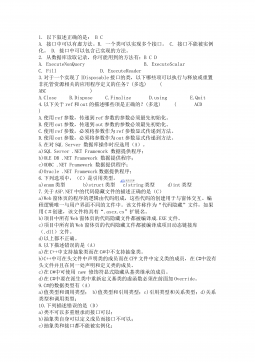
 2024-11-14 29
2024-11-14 29 -
产品需求文档 - 适合敏捷迭代开发的PRD文档应该怎么写VIP免费

 2024-11-23 5
2024-11-23 5 -
产品需求文档 - 面向产品需求的验证管理VIP免费

 2024-11-23 4
2024-11-23 4 -
产品需求文档 - 没有标准,只有沟通VIP免费
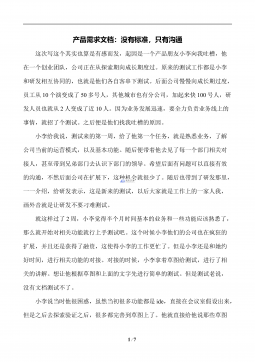
 2024-11-23 4
2024-11-23 4 -
产品需求文档 - 产品需求应该怎么写VIP免费
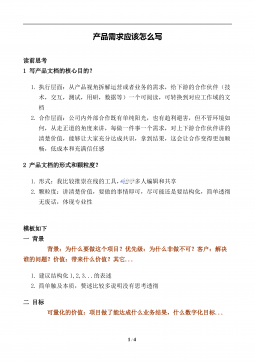
 2024-11-23 5
2024-11-23 5 -
产品需求文档 - 产品需求文档 PRD模板VIP免费

 2024-11-23 33
2024-11-23 33 -
产品需求文档 - 产品需求核心组件分析VIP免费
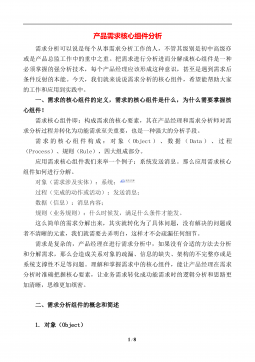
 2024-11-23 45
2024-11-23 45 -
2024版.新高考版.高考总复习.数学.5·3A版1_1集合VIP免费

 2024-11-23 29
2024-11-23 29 -
2024版.新高考版.高考总复习.数学.5·3A版1_1集合(分层集训)VIP免费

 2024-11-23 16
2024-11-23 16 -
产品需求文档 - 产品技能树之需求分析(一)VIP免费

 2024-11-23 9
2024-11-23 9
分类:外语学习
价格:5.9玖币
属性:123 页
大小:392.76KB
格式:PDF
时间:2024-12-11







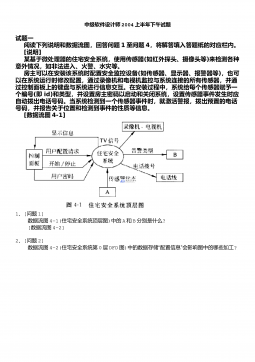
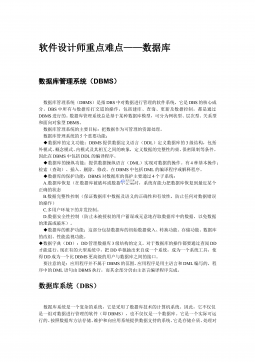
 渝公网安备50010702506394
渝公网安备50010702506394
